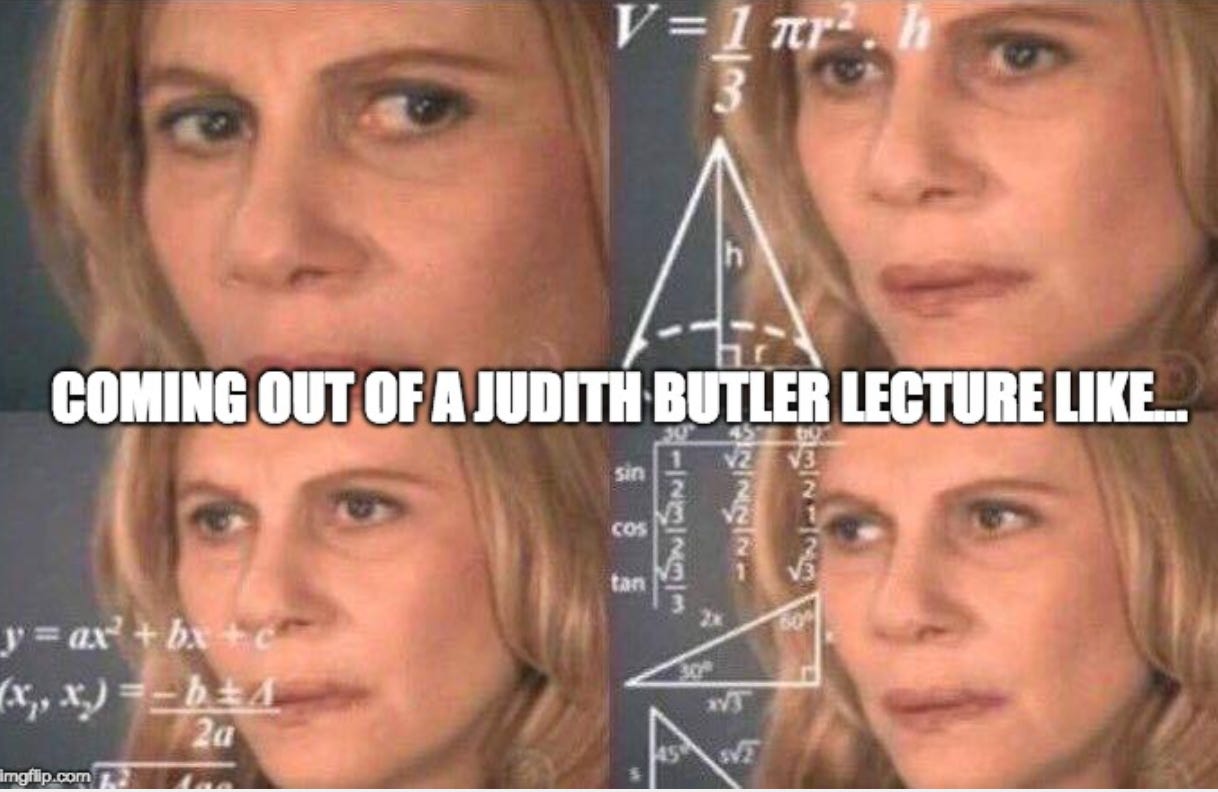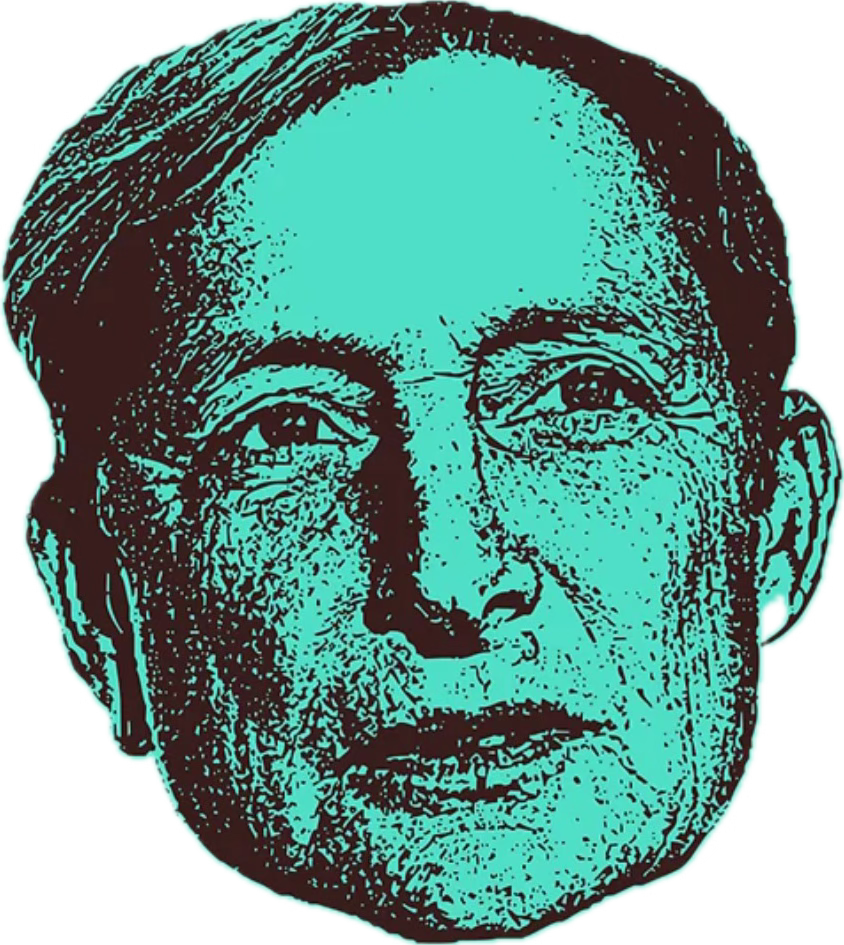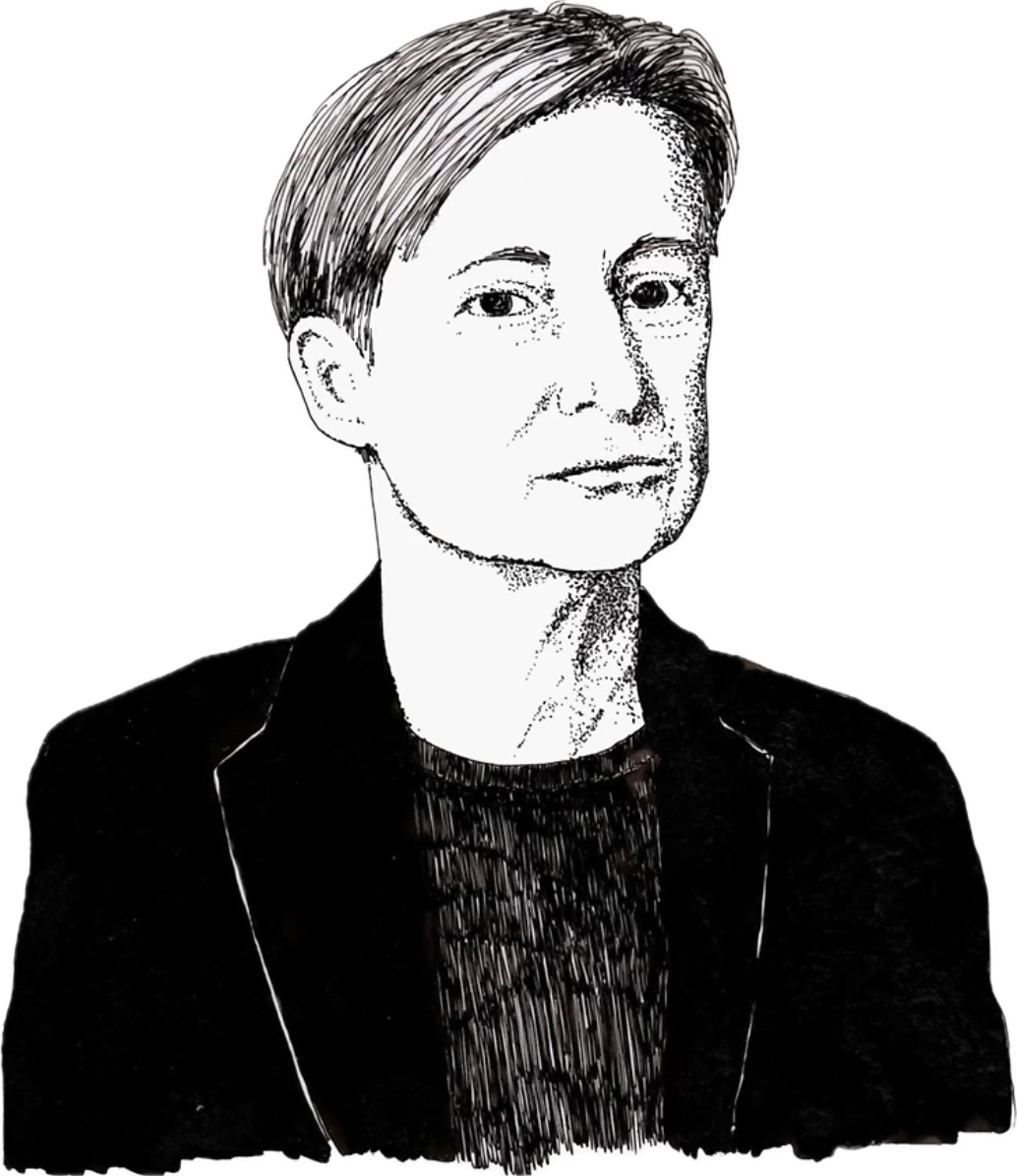Hot girls read Judith Butler
At least, that's what the internet tells me. An interview with the high priest of gender theory about their new book and more.
You’re reading Wait, Really?, a newsletter unpacking what's in the culture, with a feminist spin. Want it in your inbox? Sign up below.
The first thing I did when reading Judith Butler’s new book, “Who’s Afraid of Gender?” was look up the word “phantasm,” which appears 41 times in the introduction alone. (It means illusion; the “phantasm of gender,” a threat rooted in fear and fantasy.)
The second thing I did was chuckle about the title, because the answer to the question of who is afraid of gender was… well, me? Not of the concept, nor of the movement for equal rights, nor of gender studies programs nor gender politics. But to talk about gender today can feel so fraught, so politicized, so caught up in a war of words that rational debate, or even conversation, was no longer possible.
I am not the target of Butler’s book, though I am perhaps its intended reader. In it, the notoriously esoteric philosopher — whose prose once won a “bad writing” award, but who has become something of a pop celebrity in recent years — dismantles the way gender ideology has been constructed as a threat throughout the modern world. In Russia, it has been called a hazard to national security. The Vatican has warned it is “ugly ideology” that threatens civilization and humanity. Far right religious groups see gender as a menace to the traditional family, while conservative politicians call it code for “pedophilia” or “grooming.” In a single word, it holds the power to seemingly drive people mad with fear.
“Who’s Afraid of Gender?” comes three decades after Butler’s first and most famous book, “Gender Trouble,” brought the idea of “gender as performance” into the mainstream. As it turns out, Butler — who has written 15 books since, on subjects ranging from democracy to Jewish identity — never intended to return to the subject, even as a culture war raged. But then the political became personal: Butler was physically attacked while on speaking trip in Brazil, by protesters who shouted, “take your ideology to hell!”
We spoke by Zoom, as Butler was in Paris. (This interview has been edited and condensed; it is the expanded version of what ran in the New York Times, here.)
Did you ever think you’d see a world in which the ideas from your first book would be so widespread – and so fraught?
When I wrote “Gender Trouble,” I was a lecturer. I had no security of employment, was teaching five classes, I spent all day preparing and then trying to work on this book that I thought no one would read, except for about seven friends of mine who I could name. I didn’t tell my publisher that.
Still, I knew I wasn't just speaking for myself; there were other people who were strong feminists but also lesbian or gay or trying to figure out gender in ways that weren't always welcome within the feminist community. But today, look, the people who are afraid of my ideas are the people who don't read me. In other words, I don't think it’s my ideas that they're afraid of. They've come up with something else — a kind of fantasy of what I believe or who I am.
And of course it's not just my views that are being caricatured, but gender more broadly — gender studies, policies that focus on gender, gender discrimination, gender and healthcare, gender and violence, anything with “gender” in it is a kind of terrifying prospect, at least for some.
So… who is afraid of gender?
It's funny, I have a friend, a queer theorist. I told him the book’s name and said, "Everyone! Everyone's afraid of gender!" What’s clear to me is that there is a set of strange fantasies about what gender is– how destructive it is, and how frightening it is – that a number of forces have been circulating. So, Orban, Putin, Meloni, Rishi Sunak, Bolsonaro, Milei, and of course Ron DeSantis, Donald Trump, and lots of parents and communities in states like Oklahoma and Texas and Wyoming, who are seeking to pass legislation that bans the teaching of gender or reference to gender in books.
Obviously those folks are very frightened of gender. They imbue it with power that I actually don't think it has. But so are feminists who call themselves "gender critical," or who are trans-exclusionary, or who have taken explicit positions against trans politics.

You have a story in the book, buried in your acknowledgements, about how an experience with protesters in 2017 is what ultimately pushed you to return to this subject.
I was going to Brazil for a conference on the future of democracy. And I was told in advance that there were petitions against me speaking, and that they decided to focus on me because I'm the “papisa” — I don’t know how to say it, exactly — but the “female pope” of gender. I'm not quite sure how I got to have that distinction, but apparently I did.
And so I arrived, and the city government officials and police were waiting for me, and they took me underneath the airport, through security channels and into a car with dark windows. I had to be taken immediately to the hotel and I had to have a bodyguard with me at all times.
I got to the venue early, and I could hear the sound of crowds outside. They had built a kind of monstrous picture of me with horns, which I took to be overtly anti-Semitic — with red eyes and kind of a demonic look — with a bikini on. Like, why the bikini?
But in any case, I was burnt in effigy. And that freaked me out. And then, when my partner and I were leaving, at the airport, we were attacked: Some woman came at me with a big trolley and she was screaming about pedophilia. I could not understand why.
You thank the young man with the backpack who threw his body between you and the attacker.
When I looked back, he was being pummeled, and he was pummeling back. And I thought, this is unbelievable. I don't know who this guy is. I still wish I knew. I want to take care of him for the rest of his life.
Was that the first time you’d heard that “pedophilia” association made?
I had given a talk on Jewish philosophy, and somebody in the back said, "Hands off our children!" I thought, What? What does this have to do with me? I figured out later that the way that the anti-gender ideology movement works is to say: If you break down the taboo against homosexuality, if you allow gay and lesbian marriage, if you allow sex reassignment, then you've departed from all the laws of nature that keep the laws of morality in tact – which means it's a Pandora's box and people will start having sex with animals and with children; the whole panoply of perversions will emerge.
As I was preparing to interview you, a news alert came in about the “Don’t Say Gay” settlement in Florida, which says that K-8 schools cannot teach about LGBTQ topics but clarifies that discussing them is allowed. You write that words have become “tacitly figured as recruiters and molesters,” which is why they must apparently be removed from the classroom.
Teaching gender or critical race theory or even ethnic studies is regularly characterized as forms of “indoctrination.” So for instance, that woman who was accusing me of supporting pedophilia, suggests that my work or my teaching would be an effort at “seduction” or “grooming.” In my experience of teaching, people are arguing with each other all the time. There's so much conflict. It’s chaotic. There are many things going on — but indoctrination is not one of them.
Part of me thinks, well, we should just explain better what we actually do in the classroom. But it’s not like folks who believe that it’s indoctrination are open to argument. So I think it might be important to ask this other question: What is it they're so afraid of? Maybe they're afraid about other things that are destroying their lives or threatening their children, like climate change or war or capitalism, or any number of things.
What about the warping of language on the left?
My version of feminist, queer, trans-affirmative politics is not about policing. I don't think we should become the police. I'm afraid of the police. But I think a lot of people feel that the world is out of control, and that the one place where they can exercise some control is around language. And it seems like moral discourse comes in then: Call me this. Use this term. We agree to use this language.
The other thing I would say is that what I like most about what young people are doing — and it's not just young, but everybody's young now, according to me — is the experimentation. I love the experimentation. Like, let's come up with new language. Let's play. Let's see what language makes us feel better about our lives. But I think we need to have a little more compassion for the adjustment process.
I want to talk for a moment about categories. You have occupied many — butch, queer, woman, nonbinary — yet you’ve also said you’re suspicious of them.
At the time that I wrote “Gender Trouble,” I called for a world in which we might think about genders being proliferated beyond the usual binary of man and woman. What would that look like? What would it be? So when people started talking about being “non-binary,” I thought, well, I am that. I was trying to occupy that space of being between existing categories.
You say in the new book that the theory of performativity you laid out in “Gender Trouble” seems “questionable” today. How so?
After “Gender Trouble” was published, there were some from the trans community who had problems with it. And I saw that my approach, what came to be called a “queer approach”— which was somewhat ironic toward categories — for some people that's not okay. They need their categories, they need them to be right. Not everybody wants mobility. And I think I've taken that into account now.
But also, I think I borrowed maybe naively from some anthropology that said sex is natural and gender is social. Like, you’re born with a sex. But how that gets organized and interpreted, that's gender. Well, that was easy to understand. But when you start thinking about what goes into sex assignment, and what hospitals are doing, what lawyers are doing, what parents are doing at the moment of sex assignment — just look at gender reveal parties — there's a lot going on socially. So what makes me think that’s just pure “nature” and that society and culture enter later? They're already there at the very beginning.
This is your first book with a non-academic press. Was that a conscious decision?
Oh, yeah. I wanted to reach people.
It’s funny because many of your ideas do reach people —albeit often in the form of oversimplified, internet-era soundbites. I’m thinking, for instance, of “Gender is a drag” T-shirts or Judith Butler explained with cats. It strikes me that a lot of people who claim to have read you have actually just read the Instagram caption of you.
Well, I don't blame them for not reading that book. It was tough. And some of those sentences are truly unforgivable. Hopefully I didn't do that in “Who's Afraid of Gender?” I feel like I'm more in touch with people who are mobilizing on the ground at the global level than I have been before. And that pleases me.
How do you define gender today?
Oh, goodness.I have, I suppose, revised my theory of gender — but that's not the point of this book. I do make the point that “gender identity” is not all of what we mean by gender: It's one thing that belongs to a cluster of things. Gender is also a framework – a very important framework — in law, in politics, for thinking about how inequality gets instituted in the world.
What about the idea of “gender performance,” do you still use that language? It’s worth noting that “performativity” now seems to carry a very different connotation from how you meant it.
I know, it has nothing to do with what I meant. I'm not sure I would define gender exclusively in terms of performativity. Some people are very clear that they are a certain kind of gender, that this is their being, and for them gender is not constructed or performed. It's actually exactly who they are. I now try to take that into account.
But at the same time, for me, performativity is enacting who we are, both our social formation and what we've done with that social formation. I mean, my gestures: I didn't make them up out of thin air — there's a history of Jewish people who do this. I am inside of something, socially, culturally constructed. At the same time, I find my own way in it. And it’s always been my contention that we’re both formed and we form ourselves, and that's a living paradox.
You once said you’d asked your son if it was hard having queer parents and he told you it was hard having philosopher parents. How did your philosophical beliefs play out in raising a child?
Well, you have to understand, he's 29 now. So he's been teaching me about gender for the last 10 years — he and his friends. But it’s good! I now understand more about what they're doing. He's much more serious about it. You know, I'll make a joke. I have a long history of being ironic about sacred topics. And he will stop me and say, “Well, that's homophobic.” And it's like, “You're telling me something is homophobic?!”
Did you consciously try to free him of culturally imposed gender roles when he was young?
I think we gave him the freedom to explore. And our job was basically to try to teach him how to look after himself and how to care for others. I do think that messes with certain ideas of gender, but it wasn't explicit.











